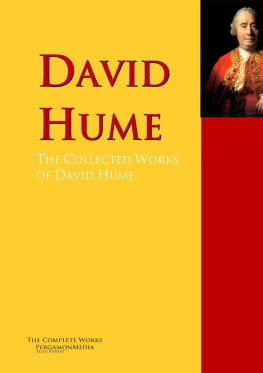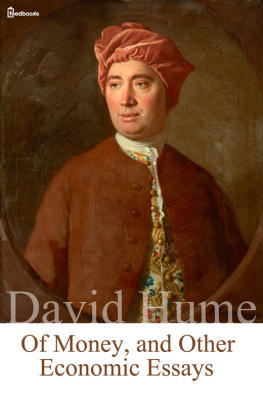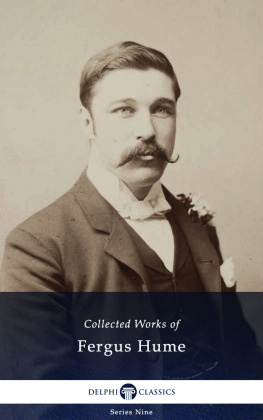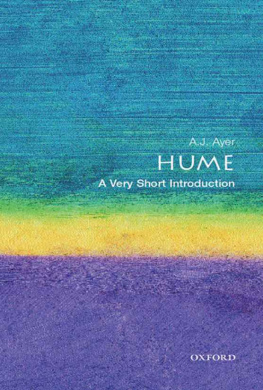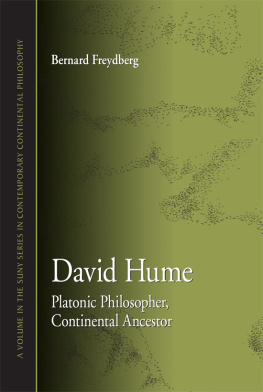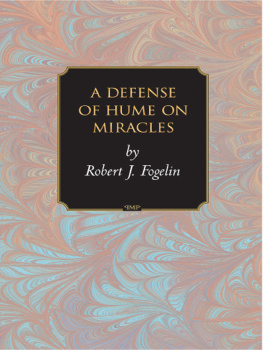David Hume - The Collected Works of David Hume
Here you can read online David Hume - The Collected Works of David Hume full text of the book (entire story) in english for free. Download pdf and epub, get meaning, cover and reviews about this ebook. year: 2015, publisher: Libreka, genre: Science. Description of the work, (preface) as well as reviews are available. Best literature library LitArk.com created for fans of good reading and offers a wide selection of genres:
Romance novel
Science fiction
Adventure
Detective
Science
History
Home and family
Prose
Art
Politics
Computer
Non-fiction
Religion
Business
Children
Humor
Choose a favorite category and find really read worthwhile books. Enjoy immersion in the world of imagination, feel the emotions of the characters or learn something new for yourself, make an fascinating discovery.
- Book:The Collected Works of David Hume
- Author:
- Publisher:Libreka
- Genre:
- Year:2015
- Rating:4 / 5
- Favourites:Add to favourites
- Your mark:
- 80
- 1
- 2
- 3
- 4
- 5
The Collected Works of David Hume: summary, description and annotation
We offer to read an annotation, description, summary or preface (depends on what the author of the book "The Collected Works of David Hume" wrote himself). If you haven't found the necessary information about the book — write in the comments, we will try to find it.
The Collected Works of David Hume — read online for free the complete book (whole text) full work
Below is the text of the book, divided by pages. System saving the place of the last page read, allows you to conveniently read the book "The Collected Works of David Hume" online for free, without having to search again every time where you left off. Put a bookmark, and you can go to the page where you finished reading at any time.
Font size:
Interval:
Bookmark:
First Edition
THE PRINCIPLES OF MORALS
AUTHOR'S ADVERTISEMENT.
Most of the principles, and reasonings, contained in this volume,
were published in a work in three volumes, called A TREATISE OF HUMAN NATURE: A work which the Author had projected before he left College, and which he wrote and published not long after. But not finding it successful, he was sensible of his error in going to the press too early, and he cast the whole anew in the following pieces, where some negligences in his former reasoning and more in the expression, are, he hopes, corrected. Yet several writers who have honoured the Author's Philosophy with answers, have taken care to direct all their batteries against that juvenile work, which the author never acknowledged, and have affected to triumph in any advantages, which, they imagined, they had obtained over it: A practice very contrary to all rules of candour and fair-dealing, and a strong instance of those polemical artifices which a bigotted zeal thinks itself authorized to employ. Henceforth, the Author desires, that the following Pieces may alone be regarded as containing his philosophical sentiments and principles.
I. Of the General Principles of Morals
II. Of Benevolence
III. Of Justice
IV. Of Political Society
V. Why Utility Pleases
VI. Of Qualities Useful to Ourselves
VII. Of Qualities Immediately Agreeable to Ourselves
VIII. Of Qualities Immediately Agreeable to Others
IX. Conclusion
I. Concerning Moral Sentiment
II. Of Self-love
III. Some Farther Considerations with Regard to Justice
IV. Of Some Verbal Disputes
DISPUTES with men, pertinaciously obstinate in their principles, are, of all others, the most irksome; except, perhaps, those with persons, entirely disingenuous, who really do not believe the opinions they defend, but engage in the controversy, from affectation, from a spirit of opposition, or from a desire of showing wit and ingenuity, superior to the rest of mankind. The same blind adherence to their own arguments is to be expected in both; the same contempt of their antagonists; and the same passionate vehemence, in inforcing sophistry and falsehood. And as reasoning is not the source, whence either disputant derives his tenets; it is in vain to expect, that any logic, which speaks not to the affections, will ever engage him to embrace sounder principles.
Those who have denied the reality of moral distinctions, may be ranked among the disingenuous disputants; nor is it conceivable, that any human creature could ever seriously believe, that all characters and actions were alike entitled to the affection and regard of everyone. The difference, which nature has placed between one man and another, is so wide, and this difference is still so much farther widened, by education, example, and habit, that, where the opposite extremes come at once under our apprehension, there is no scepticism so scrupulous, and scarce any assurance so determined, as absolutely to deny all distinction between them. Let a man's insensibility be ever so great, he must often be touched with the images of Right and Wrong; and let his prejudices be ever so obstinate, he must observe, that others are susceptible of like impressions. The only way, therefore, of converting an antagonist of this kind, is to leave him to himself. For, finding that nobody keeps up the controversy with him, it is probable he will, at last, of himself, from mere weariness, come over to the side of common sense and reason.
There has been a controversy started of late, much better worth examination, concerning the general foundation of Morals; whether they be derived from Reason, or from Sentiment; whether we attain the knowledge of them by a chain of argument and induction, or by an immediate feeling and finer internal sense; whether, like all sound judgement of truth and falsehood, they should be the same to every rational intelligent being; or whether, like the perception of beauty and deformity, they be founded entirely on the particular fabric and constitution of the human species.
The ancient philosophers, though they often affirm, that virtue is nothing but conformity to reason, yet, in general, seem to consider morals as deriving their existence from taste and sentiment. On the other hand, our modern enquirers, though they also talk much of the beauty of virtue, and deformity of vice, yet have commonly endeavoured to account for these distinctions by metaphysical reasonings, and by deductions from the most abstract principles of the understanding. Such confusion reigned in these subjects, that an opposition of the greatest consequence could prevail between one system and another, and even in the parts of almost each individual system; and yet nobody, till very lately, was ever sensible of it. The elegant Lord Shaftesbury, who first gave occasion to remark this distinction, and who, in general, adhered to the principles of the ancients, is not, himself, entirely free from the same confusion.
It must be acknowledged, that both sides of the question are susceptible of specious arguments. Moral distinctions, it may be said, are discernible by pure reason: else, whence the many disputes that reign in common life, as well as in philosophy, with regard to this subject: the long chain of proofs often produced on both sides; the examples cited, the authorities appealed to, the analogies employed, the fallacies detected, the inferences drawn, and the several conclusions adjusted to their proper principles. Truth is disputable; not taste: what exists in the nature of things is the standard of our judgement; what each man feels within himself is the standard of sentiment. Propositions in geometry may be proved, systems in physics may be controverted; but the harmony of verse, the tenderness of passion, the brilliancy of wit, must give immediate pleasure. No man reasons concerning another's beauty; but frequently concerning the justice or injustice of his actions. In every criminal trial the first object of the prisoner is to disprove the facts alleged, and deny the actions imputed to him: the second to prove, that, even if these actions were real, they might be justified, as innocent and lawful. It is confessedly by deductions of the understanding, that the first point is ascertained: how can we suppose that a different faculty of the mind is employed in fixing the other? On the other hand, those who would resolve all moral determinations into sentiment, may endeavour to show, that it is impossible for reason ever to draw conclusions of this nature. To virtue, say they, it belongs to be amiable, and vice odious. This forms their very nature or essence. But can reason or argumentation distribute these different epithets to any subjects, and pronounce beforehand, that this must produce love, and that hatred? Or what other reason can we ever assign for these affections, but the original fabric and formation of the human mind, which is naturally adapted to receive them?
The end of all moral speculations is to teach us our duty; and, by proper representations of the deformity of vice and beauty of virtue, beget correspondent habits, and engage us to avoid the one, and embrace the other. But is this ever to be expected from inferences and conclusions of the understanding, which of themselves have no hold of the affections or set in motion the active powers of men? They discover truths: but where the truths which they discover are indifferent, and beget no desire or aversion, they can have no influence on conduct and behaviour. What is honourable, what is fair, what is becoming, what is noble, what is generous, takes possession of the heart, and animates us to embrace and maintain it. What is intelligible, what is evident, what is probable, what is true, procures only the cool assent of the understanding; and gratifying a speculative curiosity, puts an end to our researches.
Next pageFont size:
Interval:
Bookmark:
Similar books «The Collected Works of David Hume»
Look at similar books to The Collected Works of David Hume. We have selected literature similar in name and meaning in the hope of providing readers with more options to find new, interesting, not yet read works.
Discussion, reviews of the book The Collected Works of David Hume and just readers' own opinions. Leave your comments, write what you think about the work, its meaning or the main characters. Specify what exactly you liked and what you didn't like, and why you think so.

